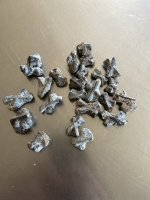firebird
Full Member
Spent all day yesterday panning at Merced River near Briceburg. Was only finding tiny flour gold but found lots of it. However I wasted a lot of time too scrutinizing all the larger gravel that I'm classifying before throwing it away for fear I might end up throwing away a larger nugget. Are my fears justified? Been thinking of getting a smaller handheld metal detector too like the Garrett Prop Pointer, would it be worth it for classified gravel or are the chances too low?
Amazon Forum Fav 👍
Upvote
0




